Related Research Articles

The Belgian Congo was a Belgian colony in Central Africa from 1908 until independence in 1960 and became the Republic of the Congo (Léopoldville). The former colony adopted its present name, the Democratic Republic of the Congo (DRC), in 1964.

Congolese music is one of the most influential music forms of the African continent. Since the 1930s, Congolese musicians have had a huge impact on the African musical scene and elsewhere. Many contemporary genres of music, such as Kenyan Benga and Colombian Champeta, have been heavily influenced by Congolese music. In 2021, Congolese rumba joined other living traditions such as Jamaican reggae music and Cuban rumba on UNESCO's "intangible cultural heritage of humanity" list.

Soukous is a genre of dance music originating from the Democratic Republic of the Congo and the Republic of the Congo. It derived from Congolese rumba in the 1960s, with faster dance rhythms and bright, intricate guitar improvisation, and gained popularity in the 1980s in France. Although often used by journalists as a synonym for Congolese rumba, both the music and dance associated with soukous differ from more traditional rumba, especially in its higher tempo, song structures and longer dance sequences.
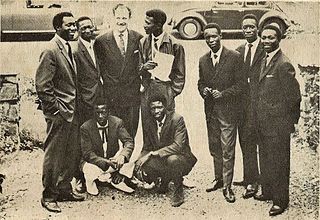
Le Grand Kallé et l'African Jazz, often simply referred to as African Jazz, was a popular and extremely influential Congolese rumba band from the modern-day Democratic Republic of the Congo. Founded in 1953 in Léopoldville under Belgian colonial rule, the band was led by Joseph Kabasele Tshamala, popularly known by his stage name Le Grand Kallé. The group saw its heyday between 1958 and 1962, after which it was hit by defections by its members in 1963. It was briefly revived after 1966.
The Bills were a youth subculture active in Léopoldville, Belgian Congo in the late 1950s, basing much of their image and outlook on the cowboys of American Western movies. Its name was taken from Buffalo Bill.
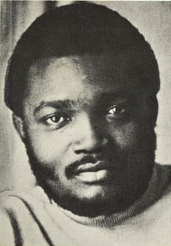
François Luambo Luanzo Makiadi was a Congolese musician. He was a major figure in 20th-century Congolese music, and African music in general, principally as the leader for over 30 years of TPOK Jazz, the most popular and significant African band of its time and arguably of all time. He is referred to as Franco Luambo or simply Franco. Known for his mastery of African Rumba, he was nicknamed by fans and critics "Sorcerer of the Guitar" and the "Grand Maître of Zairean Music", as well as Franco de Mi Amor by female fans. His most known hit, "Mario", sold more than 200,000 copies and was certified gold. In 2023, Rolling Stone ranked him at number 71 on its list of the 250 Greatest Guitarists of All Time.
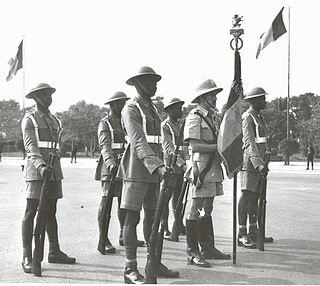
The Force Publique was the military of the Congo Free State and the Belgian Congo from 1885 to 1960. It was established after Belgian Army officers travelled to the Free State to found an armed force in the colony on Leopold II of Belgium's orders. The Force Publique was heavily involved in atrocities in the Congo Free State, and also saw action in the Congo Arab war, World War I and World War II. It was renamed to the Congolese National Army in July 1960 after Congo gained independence from Belgian colonial rule.
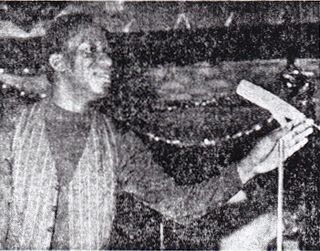
Pascal-Emmanuel Sinamoyi Tabu, better known as Tabu Ley Rochereau, was a leading African rumba singer-songwriter from the Democratic Republic of the Congo. He was the leader of Orchestre Afrisa International, as well as one of Africa's most influential vocalists and prolific songwriters. Along with guitarist Dr Nico Kasanda, Tabu Ley pioneered soukous and internationalised his music by fusing elements of Congolese folk music with Cuban, Caribbean and Latin American rumba. He has been described as "the Congolese personality who, along with Mobutu, marked Africa's 20th century history." He was dubbed "the African Elvis" by the Los Angeles Times. After the fall of the Mobutu regime, Tabu Ley also pursued a political career. His musical career ran parallel to the other great Congolese rhumba bandleader and rival Franco Luambo Makiadi who ran the band TPOK Jazz throughout the 1960s, 1970s and '80s.

Joseph Athanase Tshamala Kabasele, popularly known as Le Grand Kallé, was a Congolese singer and bandleader, considered the father of modern Congolese music. He is best known for his role as leader of the band, Le Grand Kallé et l'African Jazz, in which capacity he was involved in a number of noted songs, including Indépendance Cha Cha.
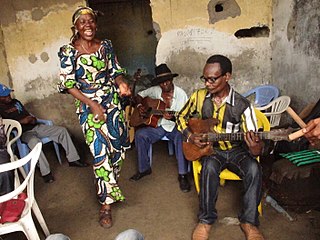
Congolese rumba, also known as African rumba, is a dance music genre originating from the Republic of the Congo and Democratic Republic of the Congo. With its rhythms, melodies, and lyrics, Congolese rumba has gained global recognition and remains an integral part of African music heritage. In December 2021, it was added to the UNESCO list of intangible cultural heritage.
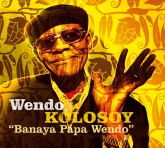
Antoine Wendo Kolosoy, known as Papa Wendo, was a Congolese musician. He is considered the "doyen" of Congolese rumba, a musical style blending traditional Kongolese rhythm and son cubano.
Kinshasa is the capital and largest city of the Democratic Republic of the Congo. It is situated on the Congo River near Pool Malebo and forms a single urban area with Brazzaville which is the capital of the neighbouring Republic of the Congo. Considered a megacity, it is among the largest urban communities in Africa.
Henri Bowane (1926–1992) was an influential figure in the development of Congolese rumba in the modern-day Democratic Republic of the Congo (DRC). He was the first professional boss and early mentor to the legendary guitarist Franco Luambo.
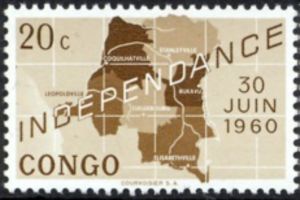
"Indépendance Cha Cha" was a song performed by Joseph Kabasele from the group L'African Jazz in the popular Congolese rumba style. The song has been described as "Kabasele's most memorable song" and one of the first Pan-African hits.
The following is a timeline of the history of the city of Kinshasa, Democratic Republic of the Congo.

Radio Belgique (French) and Radio België (Dutch) were radio broadcasts transmitted to German-occupied Belgium from London during World War II. It was produced with the support of the Belgian government in exile and formed part of the BBC's European Service.
Zacharie Elenga was a virtuoso guitarist and one of the founding fathers of modern Congolese music. His unique style of playing led him to be popularly known as Jhimmy the Hawaiian, or simply Jhimmy.

Thomas Rudolphe Kanza or Nsenga Kanza was a Congolese diplomat. He was one of the first Congolese nationals to graduate from a university. From 1960 to 1962, he served as the Democratic Republic of the Congo 's first ambassador to the United Nations and from 1962 to 1964, was a delegate to the United Kingdom. His opposition to the governments of Moïse Tshombe and Joseph-Désiré Mobutu led him to first rebel and ultimately flee the Congo. He returned in 1983, and resumed politics. From Mobutu's ousting in 1997 until his own death, Kanza served in diplomatic roles for the Congo.
Franklin Boukaka was a Congolese baritone singer, guitarist, and songwriter who is recognized as a pioneer of Congolese popular music. He performed in bands based in each of "the two Congos," i.e., the countries now named the Republic of the Congo and the Democratic Republic of the Congo; toured worldwide; achieved broad popularity; took outspoken political stances; and is widely believed to have been the victim of an extrajudicial execution during an attempted coup in the Republic of the Congo.
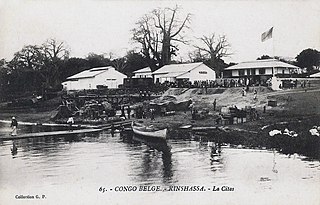
The Compagnie Industrielle et de Transports au Stanley Pool (CITAS) was a Belgian company involved in transport on the Congo River between 1902 and 1955, in what was first the Congo Free State and then the Belgian Congo, today the Democratic Republic of the Congo. The company evolved from owning a shipyard in Léopoldville (now to providing transport services on the Congo, and then to running a port in Léopoldville.
References
- ↑ Stewart 2000, p. 19.
- ↑ Impey 2008, p. 133.